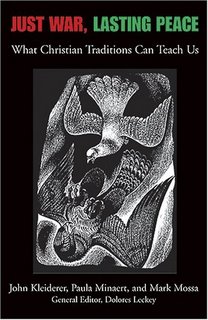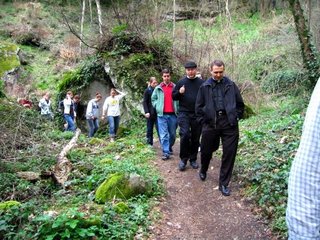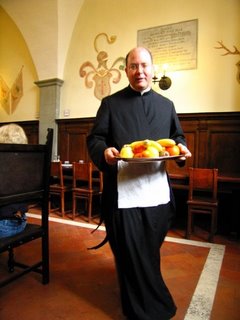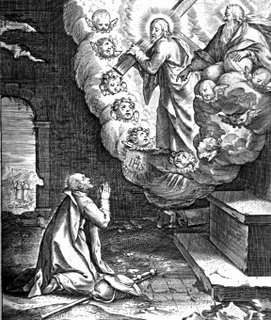Making Time for The Exercises
From
Back at Rome, he worked helping souls, and still living at the vineyard he gave the Spiritual Exercises to different people at one and the same time, one of whom lived near St. Mary Major, and the other near the Ponte Sesto.
Persecutions now began, and Michael started to be annoying and to speak ill of the pilgrim, who had him summoned to the governor’s court, first showing the governor a letter of Michael’s which praised the pilgrim highly. The governor examined Michael, and put an end to the proceedings by banishing him from
Mudarra and Barreda opened their campaign of persecution. They alleged that the pilgrim and his companions were fugitives from
With the help of the pilgrim and his companions some works of piety were founded in
After this recital, about October 20th, I asked the pilgrim about the Exercises, the Constitutions, wishing to learn how he drew them up. He answered that the Exercises were not composed all at one time, but things that he had observed in his own soul and found useful and which he thought would be useful to others, he put into writing—the examination of conscience, for example, with the idea of lines of different lengths, and so on. The forms of the election in particular, he told me, came from that variety of movement of spirits and thoughts which he experienced at Loyola, while he was still convalescing from his shattered leg. He said he would speak to me about the Constitutions that evening.
My first year of the regency period of my Jesuit formation was spent working at one of our Jesuit high schools. Things had gone somewhat amiss in the process of making my assignment, so instead of teaching as I had expected (and had been looking forward to), I was sent to be the director of campus ministry and community service which, frankly, wasn’t a very good fit for me. I expressed my reluctance to my superiors, but assured them that I would give my best to whatever was asked of me. It was a difficult year filled with many frustrations and even persecutions not unlike what Ignatius describes. Initial plans were frustrated and people who were supposed to be on my side—even a fellow Jesuit—became my persecutors. A day of frustration at work was not helped by possibly coming home to an unfriendly and perhaps even hostile reception. Yet, the amazing thing was that in spite of all this, I didn’t experience significant doubt about my vocation, even though some people observing me at the time did.
I think one of the things that saved me from despair was that I found an unexpected refuge. Early in that year a request had come for somebody to direct two women in the “19th Annotation” version of The Spiritual Exercises, basically doing the retreat in the course of everyday life. I decided to do it, without realizing what a commitment it would be. Every week, I had to set aside three to four hours of my time to meet with these women, talk to them about their prayer for that week, and give them some direction as to what to pray about next. Given how much time and energy my job took up (high school work can consume your life), this often seemed like an unwanted additional burden. It took about 30 weeks to work through the entirety of The Exercises, in the end, pretty much the whole school year. Yet, after that year of frustration and failure was over, and I had time to reflect, I realized that these few hours each week, journeying through these women’s spiritual lives, were what had helped me to stay sane in the midst of it all. As difficult as it was to see in my day to day work sometimes, this was one place where I could always see God working.
I think I can see a similar dynamic at work here at this point in Ignatius’ journey. With all the frustrations and persecutions he is suffering at this point, it seems impossible that he would continue to direct people in The Exercises as he describes. Yet, I suspect that like me in that high school year, he needed to do that, he needed that reassurance that God was working even amidst the chaos that he found himself in the middle of. Sometimes when we find ourselves in difficulty, our greatest consolation can be to recognize how God is working in the life of another. And in that we are likely to be reminded--though perhaps not right away--how God is working in our lives too.



























